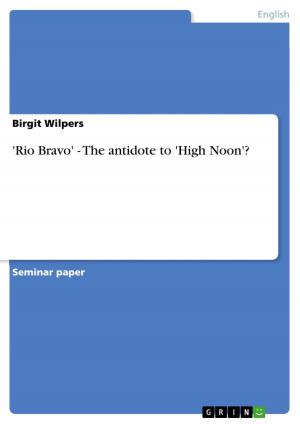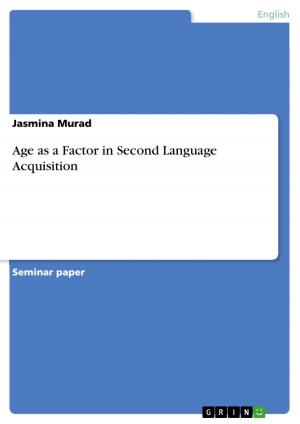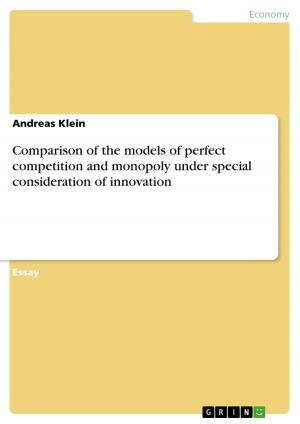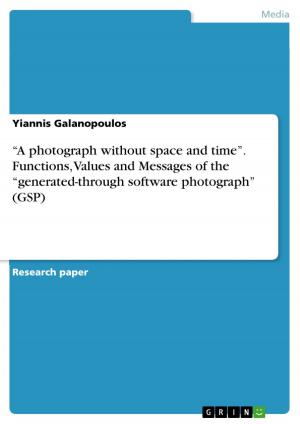National Diversity in Organisations: A study about integration between host and international students
Business & Finance, Human Resources & Personnel Management| Author: | Antje Artmann | ISBN: | 9783638215381 |
| Publisher: | GRIN Publishing | Publication: | August 29, 2003 |
| Imprint: | GRIN Publishing | Language: | English |
| Author: | Antje Artmann |
| ISBN: | 9783638215381 |
| Publisher: | GRIN Publishing |
| Publication: | August 29, 2003 |
| Imprint: | GRIN Publishing |
| Language: | English |
Diploma Thesis from the year 2003 in the subject Business economics - Personnel and Organisation, grade: 7.5 from 10, Maastricht University (Organisation and Strategy), 38 entries in the bibliography, language: English, abstract: This thesis focused on international students (Germany, Belgium, Cuba, USA, Ecuador and the Bermudas) residing in the Netherlands for the period of their studies and Dutch host students studying at the faculty of Economics and Business Administration University Maastricht, the Netherlands. The aim of this study was to examine whether the relationship between international students (n=10) and host students (n=5) is concordant (consensual) or discordant (conflictual or problematic). The acculturation orientations of both groups have been assessed using Berry's (1992, 1997) four acculturation strategies as there are: integration, assimilation, separation and marginalisation. Bourhis´ et al. (1997) Interactive Acculturation Model has been applied to explore the relational outcomes between the groups. In this study it was shown that integration is the strategy most preferred by host students. However, international students reflect separation (n=5), integration (n=3) and a mixture of integration and assimilation features (n=2). Accordingly, the acculturation profiles of host and nationally diverse students are concordant (consensual) between host- (n=5) and international students (n=5) and discordant (conflictual or problematic) between host- (n=5) and international students (n=5). The findings suggest that Dutch language skills, a Dutch partner, multinational living arrangements and interest in- and openness towards the Dutch society enhance integration and assimilation orientations. On the contrary, the geographical closeness to the home country, a close relationship to family and friends from the home city, the multilingual skills of the Dutch society, a high percentage of friends with the same nationality and linguistic background support separation orientations among international students. In addition, the large (numerical) size and homogeneity (in terms of nationality and language) of the group of German students represented at the faculty influence the acculturation orientations of international students and enhance separation orientations.
Diploma Thesis from the year 2003 in the subject Business economics - Personnel and Organisation, grade: 7.5 from 10, Maastricht University (Organisation and Strategy), 38 entries in the bibliography, language: English, abstract: This thesis focused on international students (Germany, Belgium, Cuba, USA, Ecuador and the Bermudas) residing in the Netherlands for the period of their studies and Dutch host students studying at the faculty of Economics and Business Administration University Maastricht, the Netherlands. The aim of this study was to examine whether the relationship between international students (n=10) and host students (n=5) is concordant (consensual) or discordant (conflictual or problematic). The acculturation orientations of both groups have been assessed using Berry's (1992, 1997) four acculturation strategies as there are: integration, assimilation, separation and marginalisation. Bourhis´ et al. (1997) Interactive Acculturation Model has been applied to explore the relational outcomes between the groups. In this study it was shown that integration is the strategy most preferred by host students. However, international students reflect separation (n=5), integration (n=3) and a mixture of integration and assimilation features (n=2). Accordingly, the acculturation profiles of host and nationally diverse students are concordant (consensual) between host- (n=5) and international students (n=5) and discordant (conflictual or problematic) between host- (n=5) and international students (n=5). The findings suggest that Dutch language skills, a Dutch partner, multinational living arrangements and interest in- and openness towards the Dutch society enhance integration and assimilation orientations. On the contrary, the geographical closeness to the home country, a close relationship to family and friends from the home city, the multilingual skills of the Dutch society, a high percentage of friends with the same nationality and linguistic background support separation orientations among international students. In addition, the large (numerical) size and homogeneity (in terms of nationality and language) of the group of German students represented at the faculty influence the acculturation orientations of international students and enhance separation orientations.















